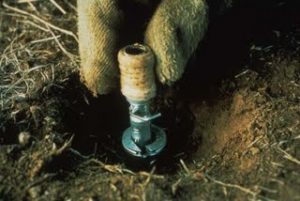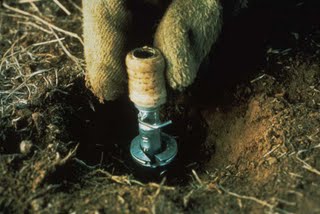
A “cyanide bomb” planted by U.S. predator-control agents targeting coyotes near homes and hiking trails in Idaho exploded when a boy handled the device, injuring him and killing his dog, authorities and relatives said on Friday.
Canyon Mansfield, 14, was playing with his yellow Labrador retriever, Casey, on Thursday afternoon near his home east of Pocatello when he saw what he thought was a sprinkler head on the ground and touched the device, causing it to detonate.
The explosion sprayed the boy and his 3-year-old, 90-pound (40 kg) pet with toxic cyanide gas, according to the boy’s mother, Theresa Mansfield.
“Canyon said there was a bang like a bomb, then an explosion of an orange substance that covered him and Casey, who was writhing in pain on the ground before he died right in front of Canyon,” she said.
Her husband, Pocatello physician Mark Mansfield, rushed to the scene and pounded on the dog’s chest in a futile effort to revive the animal.
The family and first-responders underwent decontamination procedures and the boy, who was sprayed in the face, was tested for cyanide poisoning at a hospital for the second time Friday, officials and family members said.
The device, called an M-44, was among several placed in the area by Wildlife Services, an arm of the U.S. Department of Agriculture that targets coyotes, wolves, cougars, foxes and other animals considered nuisances to farms and ranches.
The agency has been sued by conservation groups claiming that its programs to poison, trap and shoot various predator species violate federal environmental and wildlife protection laws.
Thursday’s incident marked the first “unintentional lethal take of a dog” by an M-44 in Idaho since 2014, and Wildlife Services seeks to minimize hazards to pets and humans by posting warnings, spokesman Andre Bell said.
“These devices are only set at the request of and with permission from property owners or managers,” the agency said. They are “spring-activated” and “not explosive devices,” it said.
Bannock County Sheriff Lorin Nielsen, who described the devices as “cyanide bombs,” said no notice was given to authorities about their placement.
“I’ve been a sheriff here for 20 years and worked for the office for 39 years, and I’ve never heard of leaving around a device that emits poisonous gas,” he said.
Nielsen said he intended to meet federal officials next week to “get to the bottom of this.”
Theresa Mansfield said Wildlife Services had not sought to contact the family to apologize for the incident.
(Editing by Steve Gorman; Editing by Paul Tait)
